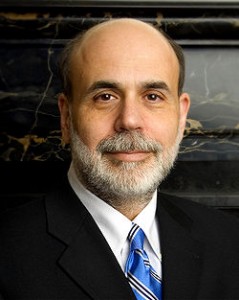CONTACT: Doug Gordon, (202) 822-5200 x237
LEADING FINANCIAL REFORM COALITION POSES QUESTIONS FOR FED CHIEF BERNANKE
Continued Bank Control of Regional Fed Banks Comes Under Fire
Will “Too Big to Fail” Taxpayer Bailouts of Reckless Big Banks Remain Policy?
Americans for Financial Reform called on Federal Reserve Chairman Ben Bernanke to explain how the Federal Reserve failed to recognize a looming $8 trillion housing bubble and allowed the issuance of unaffordable and toxic mortgages to continue, requiring a taxpayer bailout of major bank holding companies like Citigroup and Bank of America. Mr. Bernanke must answer questions about the failure of the current regulatory regime to protect the nation’s economy and citizens and avoid future meltdowns like the one that has devastated Main Street America, according to the leading coalition of financial reform advocates.
Americans for Financial Reform, comprised of over two hundred consumer, civil rights and labor organizations, has called for major changes, many of which are embodied in Senator Christopher Dodd’s proposed legislation. The coalition favors reform measures that would impose much-needed accountability and transparency on the existing, deeply inadequate financial regulatory system. It urges Senators to raise at least the following questions when Chairman Bernanke testifies at today’s hearing:
- Can you direct this Committee to any document issued by the Federal Reserve System that assesses the responsibility of the Board of Governors of the Federal Reserve for the crisis, and in particular assesses the effectiveness of the Board of Governors’ regulation of bank holding companies like Citigroup and Bank of America during this period? If no such self-assessment exists, when will you do one?
- When big banks fail, why should the Fed, whose regulatory capacity resides in regional banks whose boards are comprised of the very institutions it is charged with regulating, be in charge of resolving the consequent problems? Shouldn’t resolution authority for large financial institutions be given to a fully independent, public body without the obvious conflict of interest that the Fed, as currently governed, embodies?
- Since the big banks bear much of the responsibility for the meltdown and consequent recession and high rates of unemployment, would you support ending the banks’ role in selecting the directors of the regional Federal Reserve banks that actually do the regulating of bank holding companies?
- Since 1994, the Federal Reserve has had the power – indeed the duty – under the Home Ownership and Equity Protection Act to prohibit loans that are “unfair, deceptive,” or “otherwise not in the interest of the borrower.” This sweeping power could have curtailed many of the abusive and predatory mortgage lending tactics that triggered a massive wave of foreclosures on subprime and Alt-A mortgages, but it was not invoked until 2008, long after the foreclosure crisis became apparent. When did you first encourage the Board of Governors to invoke this law? And has the Board of Governors conducted any assessment of its failure to invoke the law before it did? In the wake of the Board’s failure to act in this crucial area, why do you oppose the creation of a Consumer Financial Protection Agency?
- The Glass-Steagall Act, passed under FDR in response to the Great Depression, served us well for decades by separating commercial and investment banking, thereby avoiding the type of reckless speculative behavior that led to the current meltdown. This law was repealed in 1999 and since then our economy has experienced the disastrous fall-out from the collapse of two speculative bubbles and rampant predatory lending. The Group of Thirty, including your predecessor Paul Volcker, has called for separating commercial banking from proprietary trading in securities and derivatives markets. Do you support measures that would restore the separation of commercial and investment banking?
- The measures you have taken to put the financial system back on track have left a handful of bank holding companies larger than they were prior to the crisis, unwilling as yet to lend money, and apparently engaged in some of the same risky investing behavior that led to the mess we’re in. If they were too big to fail this time around, they will be even bigger in the event of a future calamity. What will you do to reduce the moral hazard that this state of affairs represents? The current situation only encourages reckless speculation by the major financial institutions who have just been assured that they will never be held accountable for their actions.
- Americans are concerned that a hidden bailout of Wall Street has occurred through the Federal Reserve System. We believe this situation calls for an audit of the Federal Reserve by the GAO, something that you have resisted. How can you reconcile your position with your putative support for increased transparency and accountability?
While there are other important questions that we expect Senators to ask Chairman Bernanke, we believe these are the fundamental ones about the control, accountability and transparency of the Federal Reserve to which we and most Americans want and should expect clear answers.
(Photo: Federal Reserve OPA via Wikipedia)

